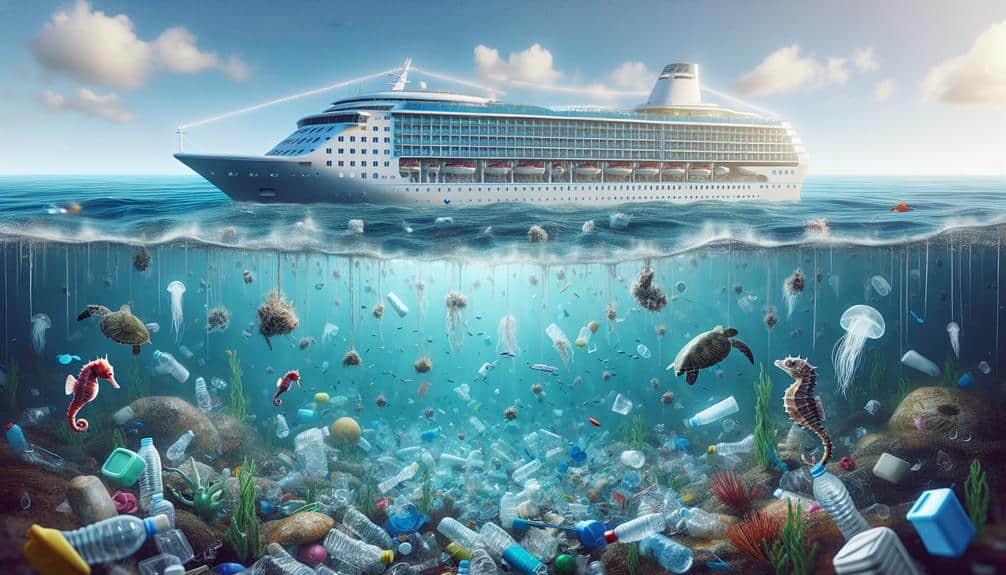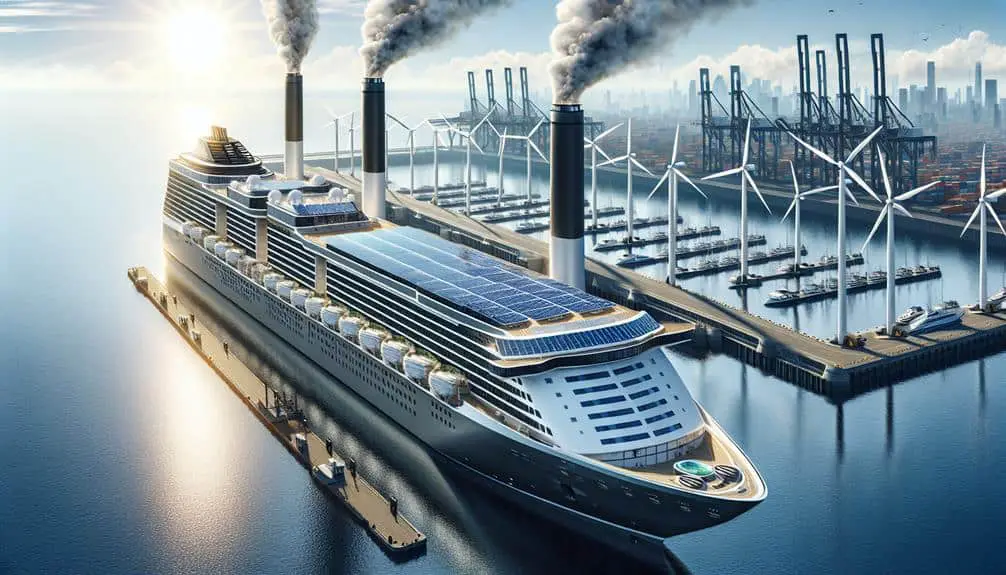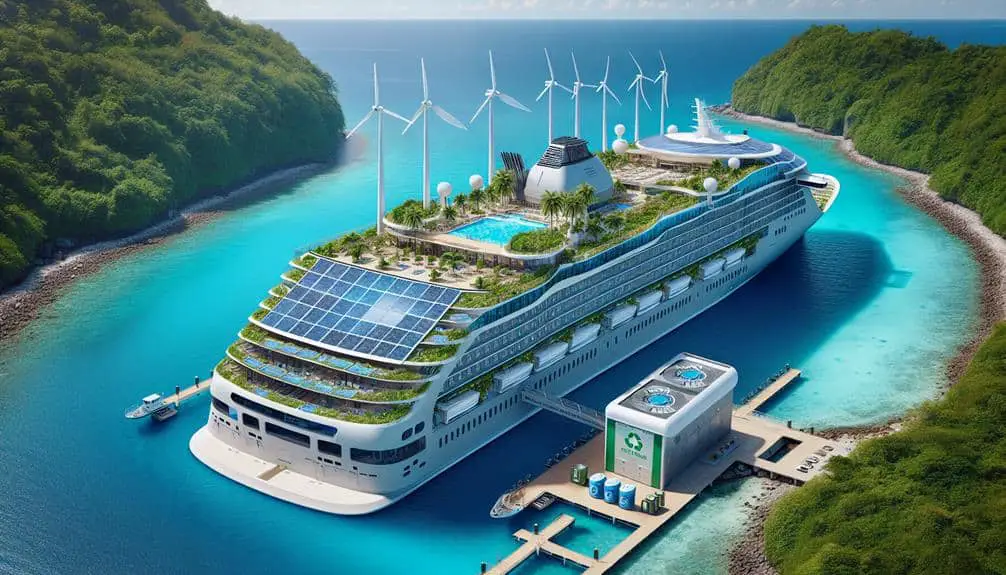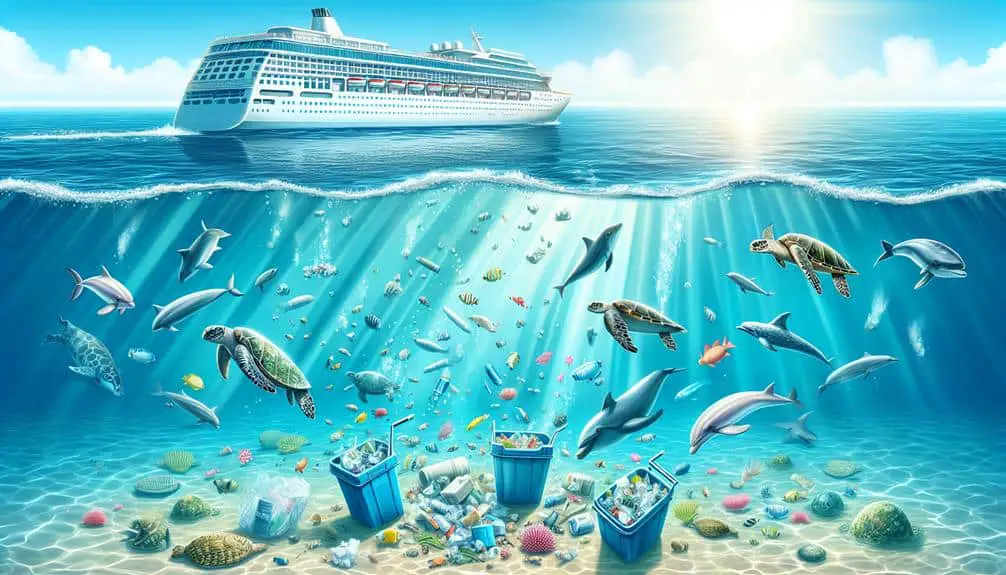Plastic waste generated on cruise ships harms marine ecosystems. Incineration of plastic raises air pollution concerns. Implementing recycling programs onboard can curb incineration. Plastic pollution threatens marine species and ecosystems. Crucial measures like reducing single-use plastics are essential. Recycling challenges at sea necessitate innovative solutions. Raising awareness and proper waste disposal are key. Sustainable alternatives like refillable bottles and biodegradable straws mitigate impact. Green technologies and waste management practices help. Sustainable practices and waste reduction techniques reduce environmental harm. Explore more about sustainable solutions for cruise ship plastic waste impacts.
Key Points
- Cruise ships generate substantial plastic waste, threatening marine ecosystems.
- Plastic pollution endangers marine species and disrupts ecosystem balance.
- Recycling programs onboard can reduce plastic waste sent for incineration.
- Sustainable alternatives like refillable bottles and biodegradable straws are effective.
- Implementing green technologies and waste management practices is crucial for minimizing environmental impact.
Plastic Waste Generation on Cruise Ships
When cruising, passengers and crew collectively generate a substantial amount of plastic waste on cruise ships, contributing to the environmental impact of these voyages. The management of this waste is an important aspect that cruise lines need to address.
One common method used for plastic waste disposal on cruise ships is onboard incineration. While this method helps reduce the volume of plastic waste, it also raises concerns about air pollution and the release of harmful toxins into the atmosphere.
Effective waste management strategies are essential to mitigate the environmental consequences of plastic waste generation on cruise ships. Implementing recycling programs onboard can greatly reduce the amount of plastic sent for incineration. Additionally, cruise lines should invest in advanced waste treatment technologies that minimize the environmental impact of onboard incineration.
Impact of Plastic Pollution in Oceans
As plastic waste from cruise ships finds its way into the oceans, the impact of plastic pollution on marine ecosystems becomes increasingly concerning. Marine ecosystems, home to a vast array of marine life, are facing severe threats due to the presence of plastic pollution. Plastics in the oceans not only pose physical risks like entanglement but also introduce harmful chemicals into the water, endangering marine species and disrupting the delicate balance of these ecosystems.
To address the issue of plastic pollution in oceans caused by cruise ships, pollution prevention measures must be implemented. Cruise lines can adopt practices such as reducing single-use plastics onboard, implementing advanced waste management systems, and increasing recycling efforts. Additionally, educating passengers and crew about the importance of proper waste disposal and recycling can help minimize plastic waste entering marine environments.
Challenges in Plastic Recycling at Sea
Facing the vast expanse of the ocean, cruise ships encounter significant challenges in effectively recycling plastic waste at sea. The primary challenge lies in the logistics of segregating, storing, and processing the plastic materials onboard, given the limited space and resources available. Traditional recycling methods used on land are often not feasible due to the lack of infrastructure and specialized equipment required for at sea recycling. Additionally, the sheer volume of plastic waste generated daily on a cruise ship further complicates the recycling process.
To overcome these challenges, cruise lines are exploring innovative solutions such as investing in onboard plastic recycling technologies. These technologies aim to compact, shred, and process plastic waste onboard, making it easier to store and transport for proper disposal once the ship reaches port. Implementing stringent waste segregation protocols and raising awareness among passengers and crew about the importance of recycling can help improve at sea recycling efforts. By adopting a proactive approach and investing in sustainable practices, cruise ships can mitigate the environmental impact of plastic use on the oceans.
Alternatives to Single-Use Plastics
Consider exploring sustainable alternatives to single-use plastics on cruise ships to reduce environmental impact. Reusable options and eco-friendly solutions can greatly lessen the negative effects of plastic waste.
One effective alternative is to provide passengers with refillable water bottles that they can use throughout their voyage. This not only reduces plastic bottle usage but also encourages passengers to be more conscious of their plastic consumption. Another option is to replace single-use plastic straws with biodegradable or reusable alternatives like paper, bamboo, or stainless steel straws. Implementing these changes can lead to a substantial reduction in plastic waste generated onboard.
Furthermore, using washable dishes, utensils, and cups instead of disposable ones can significantly minimize plastic usage. Cruise lines can also offer amenities such as shampoo and soap dispensers in bathrooms to eliminate the need for single-use plastic toiletry bottles. By adopting these eco-friendly practices, cruise ships can make a positive impact on the environment and promote sustainability within the industry.
Sustainable Practices for Cruise Ships
Implementing sustainable practices on cruise ships, such as waste reduction strategies and energy-efficient technologies, is essential for minimizing environmental impact and promoting eco-friendly operations. To achieve this, cruise lines are increasingly turning to green technology solutions and innovative waste management practices.
Green technology encompasses a range of environmentally friendly options, including solar panels for onboard energy generation, LED lighting to reduce electricity consumption, and advanced water treatment systems to minimize wastewater discharge. These technologies not only lower the carbon footprint of cruise ships but also showcase a commitment to sustainability.
Effective waste management is another critical aspect of sustainable operations. Cruise ships are adopting strategies like recycling programs, composting organic waste, and incinerating non-recyclable materials at high temperatures to reduce volume. By implementing these waste reduction techniques, cruise lines can limit the amount of waste sent to landfills and decrease their overall environmental impact.
Frequently Asked Questions
How Do Cruise Ships Manage Plastic Waste Disposal in Remote or International Waters?
When cruising remote waters, managing plastic waste on ships is as important as steering through turbulent seas. Recycling processes are essential. International regulations and jurisdiction boundaries impact waste disposal. Stay informed to minimize environmental harm.
What Are the Specific Regulations and Guidelines in Place for Cruise Ships Regarding Plastic Usage and Disposal?
To guarantee regulations compliance, cruise ships implement waste management strategies. They adhere to specific guidelines for plastic usage and disposal. By following these protocols, the environmental impact of plastic on cruise ships is minimized, promoting sustainability at sea.
Are There Any Current Technologies Being Developed to Minimize Plastic Use and Waste on Cruise Ships?
You're curious about sustainable alternatives and innovative technology solutions onboard cruise ships. Embracing eco-friendly practices, the industry works towards minimizing plastic waste. Keep an eye out for cutting-edge innovations to enhance environmental stewardship.
How Do Cruise Ship Companies Educate Passengers and Crew Members About the Environmental Impact of Plastic Use?
To educate passengers and crew on plastic's impact, cruise companies engage through sustainability campaigns, raising environmental awareness. They provide training sessions for crew members, encouraging active participation in reducing plastic usage and waste onboard.
What Initiatives Are Being Taken by Cruise Ship Companies to Collaborate With Local Communities and Organizations to Address Plastic Pollution Issues in the Areas They Visit?
In the quest for sustainability and environmental stewardship, cruise ship companies are forging community partnerships with local organizations. By engaging in such initiatives, they actively contribute to addressing plastic pollution issues in the areas they visit.




